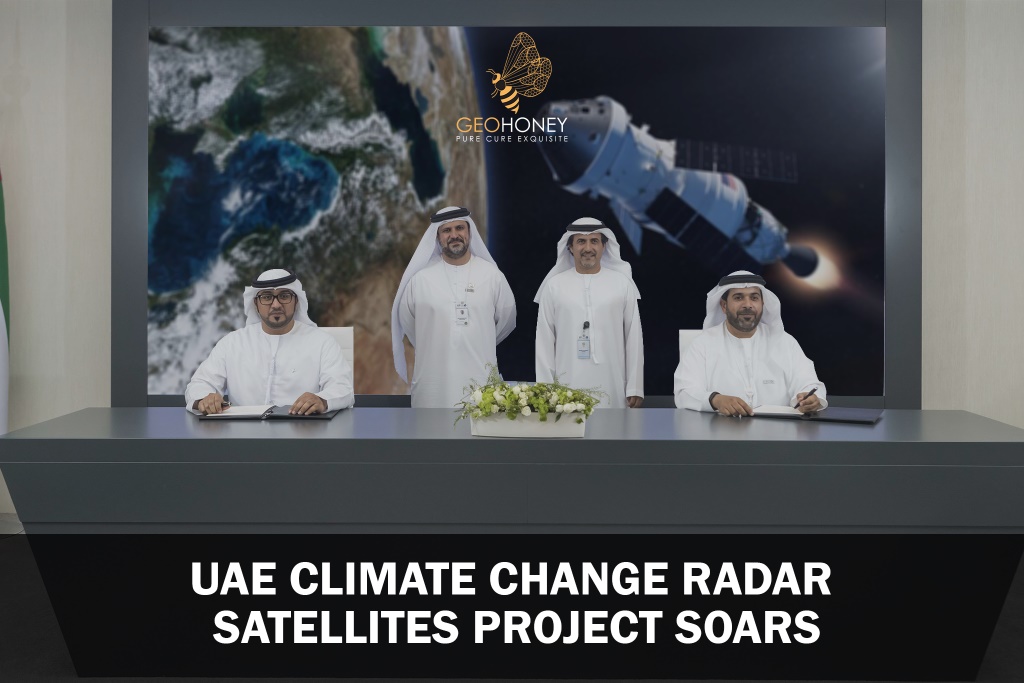- Tokyo: 01:32
- Singapore: 00:32
- Dubai: 20:32
- London: 16:32
- New York: 11:32
UAE's Climate Change Radar Satellites Project Soars

Sheikh Khaled bin Mohamed bin Zayed Al Nahyan, Crown Prince of Abu Dhabi and Chairman of the Abu Dhabi Executive Council, and Sheikh Hamdan bin Mohammed bin Rashid Al Maktoum, Crown Prince of Dubai and Chairman of the Dubai Executive Council, have kicked off the execution phase of the Sirb satellite programme, marking a watershed moment in the country's space development.
The Crown Princes were given a detailed outline of the project's goals and the innovative technologies that would be developed in the satellite initiative. A national industrial consortium overseen by the UAE Space Agency informed them on the project's milestones and the methods for developing and operating the satellites.
Radar satellites
The first satellite, which will be launched in 2026, will complement the UAE's investment in remote sensing technologies that use multiple satellite imagery to service various sectors. Radar satellites can acquire photos at any time of day or night, regardless of air conditions. This ground-breaking project represents the first time a constellation of three synthetic aperture radar (SAR) satellites has been developed, employing cutting-edge imaging technology to deliver high-precision results in all weather situations.
By relying on qualified national talent and UAE companies, the project aims to strengthen the UAE's efforts to find solutions to climate change challenges and environmental sustainability, contribute to urban development, integrate efforts to combat natural disasters, and support food security challenges.
Commercialisation of data
By relying on qualified national talent and UAE companies, the project aims to strengthen the UAE's efforts to find solutions to climate change challenges and environmental sustainability, contribute to urban development, integrate efforts to combat natural disasters, and support food security challenges.
As an extension of the Space Economic Zones project, it also intends to foster collaborations with worldwide organisations and give incentives in order to solidify the UAE's status as a global hub for talent, investment, and innovation.
UAE as global satellite hub
"We will enhance local expertise in the field of space to support our ambitious vision for the UAE to become a global hub for manufacturing and operating satellites," Sheikh Khaled added. We are focusing on providing chances for national firms and the private sector to participate in this historic trip and to contribute to the development of the space sector's infrastructure."
"Sirb marks a strategic turning point in the UAE space sector, transitioning from a governmental and academic sector to an integrated governmental, private, and academic sector that supports the development of microtechnology and advances the industrial development of the space sector," Sheikh Hamdan said. Our top aim is to empower start-ups, SMEs, and entrepreneurs, as they are the primary drivers of economic growth."
Space consortium
EDGE will administer the initiative as a strategic partner, with a special emphasis on the development of Synthetic Aperture Radar (SAR) payloads. Yahsat and Bayanat will oversee satellite operations and data, while NSSTC will help with assembly, integration, and testing (AIT).
The consortium will continue to collaborate with other industry players, SMEs, and startups to strengthen the program's overall expertise and capabilities and to assist the growth of the space private sector.
Source: gulfnews.com




Very interesting news, a solution to climate change challenges and for a sustainable environment.